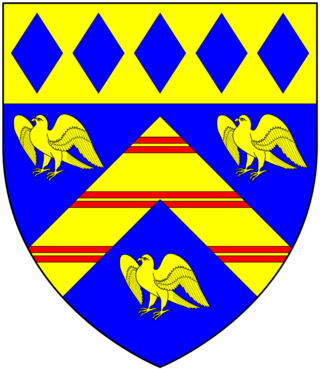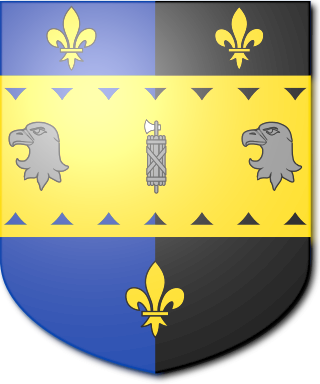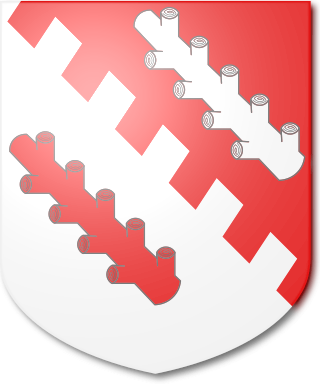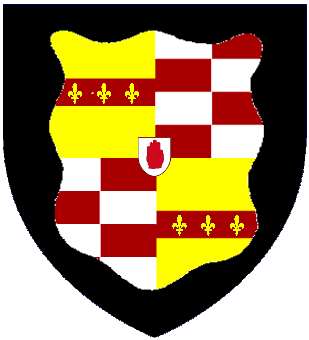
Baron Roborough, of Maristow in the County of Devon, is a title in the Peerage of the United Kingdom. It was created on 24 January 1938 for Sir Henry Lopes, 4th Baronet. He had earlier represented Grantham, Lincolnshire, in Parliament as a Conservative. The Baronetcy, of Maristow House in the County of Devon, had been created in the Baronetage of the United Kingdom on 1 November 1805 for Manasseh Masseh Lopes, a member of a wealthy family of Portuguese Jewish origin, with special remainder to his nephew Ralph Franco, son of his sister Maria. Manasseh Masseh Lopes converted to Christianity in 1802, and later represented Evesham, in Worcestershire, Barnstaple in Devon, and Westbury in Somerset, in Parliament. However, in 1819 he was twice convicted of bribing the voters in both Barnstaple and Grampound in order to be elected to Parliament, and was sentenced to imprisonment and heavy fines. He was also unseated by the House of Commons, but after his release from prison he nonetheless got elected for Westbury, a pocket borough which he controlled to a great extent.

The Antrobus Baronetcy, of Antrobus in the County Palatine of Chester, is a title in the Baronetage of the United Kingdom.

The Whitehead Baronetcy, of Highfield House in Catford Bridge in the County of Kent, is a title in the Baronetage of the United Kingdom. It was created on 26 November 1889 for James Whitehead, Lord Mayor of London between 1888 and 1889 and later member of parliament for Leicester. His younger son, the third baronet, was also a Member of Parliament.
The Madden Baronetcy, of Kells, County Kilkenny, is a title in the Baronetage of the United Kingdom. It was created in 1919 for the naval commander, Admiral Sir Charles Madden. He was succeeded by his son, the second Baronet, who was also a distinguished naval officer and served as Commander-in-Chief of the Home Fleet between 1963 and 1965.
Sir Peter Geoffrey Roberts, 3rd Baronet was a British Conservative Party politician.

The Wigram Baronetcy, of Walthamstow House in the County of Essex, is a title in the Baronetage of the United Kingdom. It was created on 30 October 1805 for Robert Wigram, a successful shipbuilding merchant and politician, representing Fowey and Wexford Borough in the House of Commons. The second Baronet also represented Wexford Borough in Parliament. He assumed in 1832 by Royal licence the surname of Fitzwygram. The fourth Baronet was a Lieutenant-General in the army and sat as a Conservative Member of Parliament for South Hampshire and Fareham.

The Boyle Baronetcy, of Ockham in the Parish of Salehurst in the County of Sussex, is a title in the Baronetage of the United Kingdom. It was created on 14 December 1904 for Edward Boyle, a barrister, businessman and Conservative Member of Parliament for Taunton. His grandson, the third Baronet, was also a Conservative Member of Parliament and ultimately cabinet minister serving as Minister of Education from 1962 to 1964. He was made a life peer as Baron Boyle of Handsworth, of Salehurst in the County of Sussex, in 1970 and became vice-chancellor of the University of Leeds in the same year. The life peerage became extinct on his death in 1981 and he was succeeded in the baronetcy by his younger brother, the fourth Baronet. As of 2023 the title is held by the latter's eldest son, the fifth Baronet, who succeeded in 1983.

The Barrett-Lennard Baronetcy, of Belhus in the County of Essex, is a title in the Baronetage of the United Kingdom. It was created on 30 June 1801 for Thomas Barrett-Lennard, subsequently Member of Parliament for Essex South. He was the illegitimate son and testamentary heir of Thomas Barrett-Lennard, 17th Baron Dacre. He was succeeded by his grandson, the second Baronet, the son of Thomas Barrett-Lennard, Member of Parliament for Maldon. His son, the third Baronet, was childless and was succeeded by his younger brother, the fourth Baronet. This line of the family failed on the death in 1977 of his son, the fifth Baronet, who died without male issue. The late Baronet was succeeded by his third cousin once removed, the sixth Baronet. He was the son of Sir Fiennes Cecil Arthur Barrett-Lennard, Chief Justice of Jamaica, son of Captain Thomas George Barrett-Lennard, son of the first marriage of George Barrett-Lennard, son of John Barrett-Lennard, second son of the first Baronet. The sixth Baronet was a Catholic clergyman. As of 2014 the title is held by his second cousin, the seventh Baronet, who succeeded in 2007. He is the grandson of Trenchard Barrett-Lennard, son of the aforementioned George Lennard-Barrett by his second marriage. As of 31 December 2013 the present Baronet has not successfully proven his succession and is therefore not on the Official Roll of the Baronetage, with the baronetcy considered vacant since 2007.

The Briscoe Baronetcy, of Bourn Hall, in the Parish of Bourn, in the County of Cambridge, is a title in the Baronetage of the United Kingdom. It was created on 12 July 1910 for John James Briscoe. He was a County Alderman, a Justice of the Peace and Deputy Lieutenant for Cambridgeshire. His eldest son, the second Baronet, died childless and was succeeded by his younger brother, the third Baronet. As of 2023 the title is held by the latter's great-grandson, the sixth Baronet, who succeeded from birth in 1994, his father having died earlier that year.

The Blaker Baronetcy, of Brighton in the County of Sussex, is a title in the Baronetage of the United Kingdom. It was created on 5 September 1919 for Sir John Blaker. He was Mayor of Brighton from 1895 to 1898. He was succeeded by his son, the second Baronet. He sat as Conservative Member of Parliament for Spelthorne from 1931 to 1945. As of 2007 the title is held by his son, the third Baronet, who succeeded in 1975.

The Crisp Baronetcy, of Bungay in the County of Suffolk, is a title in the Baronetage of the United Kingdom. It was created on 5 February 1913 for the lawyer and microscopist Sir Frank Crisp.
The Huntington-Whiteley Baronetcy, of Grimley in the County of Worcester, is a title in the Baronetage of the United Kingdom. It was created on 8 February 1918 for Herbert Huntington-Whiteley, Conservative Member of Parliament for Droitwich.
Sir Samuel Roberts, 1st Baronet PC, DL was a British politician and businessman.
Sir Samuel Roberts, 2nd Baronet JP was a British politician.

The Wiggin Baronetcy, of Metchley Grange in Harborne in the County of Stafford and of Garth Gwynion in Machynlleth in the County of Montgomery, is a title in the Baronetage of the United Kingdom. It was created on 17 June 1892 for Henry Wiggin. He was the founder of Henry Wiggin and Co Ltd, manufacturers of specialty metal products, and also represented Staffordshire East and Handsworth in the House of Commons. The second Baronet was High Sheriff of Staffordshire in 1896. The third Baronet was a colonel in the army and served as High Sheriff of Warwickshire in 1942. The fourth Baronet was high sheriff of Warwickshire from 1975 to 1976 and a deputy lieutenant of the county in 1985.

The Maclure Baronetcy, of The Home in Whalley Range near Manchester in the County Palatine of Lancaster, is a title in the Baronetage of the United Kingdom. It was created on 12 March 1898 for John William Maclure. He was Secretary of the Famine Relief Fund from 1862 to 1865 and sat as Conservative Member of Parliament for Stretford between 1886 and 1901.

The Peek Baronetcy, of Rousdon in the County of Devon, is a title in the Baronetage of the United Kingdom. It was created on 13 May 1874 for Henry Peek. He was an importer of spices, tea and other groceries, a philanthropist and Conservative Member of Parliament for Surrey Mid. The second Baronet was an astronomer and meteorologist; the third Baronet was high sheriff of Devon in 1912.

The Price, later Rugge-Price Baronetcy, of Spring Grove in Richmond in the County of Surrey, is a title in the Baronetage of the United Kingdom. It was created on 2 February 1804 for Charles Price, Member of Parliament for the City of London from 1802 to 1812 and Lord Mayor of London from 1802 to 1803. The fifth Baronet assumed in 1874 by Royal licence the additional surname of Rugge. As of 28 February 2014 the present Baronet has not successfully proven his succession and is therefore not on the Official Roll of the Baronetage, with the baronetcy considered dormant since 2000.

The Mills Baronetcy, of Ebbw Vale in the County of Monmouth, was created in the Baronetage of the United Kingdom in 1921 for the industrialist and Conservative Member of Parliament Frederick Mills. The second Baronet was Director of Public Works of Sierra Leone between 1939 and 1942 and of Uganda between 1942 and 1947.

The Palmer Baronetcy, of Carlton in the County of Northampton, was created in the Baronetage of England on 7 June 1660 for the lawyer and politician Geoffrey Palmer. The second Baronet was Member of Parliament for Higham Ferrers. The third, fourth and fifth Baronets all represented Leicestershire in the House of Commons. The fifth Baronet served as High Sheriff of Leicestershire in 1782 and the eighth Baronet as High Sheriff of Northamptonshire in 1871.















